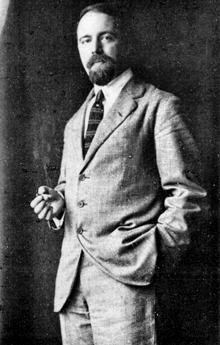Pieter Geyl
Pieter Catharinus Arie Geyl (born December 15, 1887 in Dordrecht , † December 31, 1966 in Utrecht ) was a Dutch historian .
Scientific career
Geyl or (Dutch spelling) Geijl studied Dutch literature in Leiden and received his doctorate in 1913 on a historical subject. In the same year he became a correspondent for the Nieuwe Rotterdamsche Courant in London . In 1919 a "Dutch Studies" chair was set up for Geyl at University College London , which was financed by Dutch entrepreneurs with the support of the Dutch embassy and was later renamed "Dutch History".
In his studies, Geyl focused on Belgian-Dutch relations. He described the separation of the Netherlands after the Eighty Years' War in the 16th century as the result of military coincidences which could not justify treating the two territories separately. He wrote Greater Dutch history against the national historiography in the Netherlands, which he called "Little Dutch", and especially against the Belgian historiography after Henri Pirenne . For him, the Netherlands and Flanders were part of a single Dutch tribe with a common culture , while Belgium was just a product of art. His attacks on the Belgian state resulted in an entry ban in Belgium from 1929 to 1933.
Geyl supported the Flemish Movement from London and maintained intensive correspondence with many of its representatives. Together with Frederik Carel Gerretson , he fought against the Belgian-Dutch treaty . In 1933 he convicted the historian Colenbrander of plagiarism. Because of his political activities and his polemical appearance, he was also controversial in the Netherlands, so that it was not until 1936 that he was offered the chair of Dutch history at the University of Utrecht .
In Utrecht he took a clear stand against fascism as a member of the Eenheid door democratie group . During the German occupation he was held hostage a . a. in the Buchenwald concentration camp internment and only 1943 released on health grounds.
After the war Geyl became a member of the joint commission for the execution of the Belgian-Dutch cultural treaty of 1946. Nevertheless, Geyl remained true to his Great Dutch beliefs and spoke in 1962 on the Flemish-nationalist IJzerbedevaart .
Geyl was made a member of the Royal Netherlands Academy of Sciences in 1941 and received numerous honors, especially in the English-speaking world. In 1961 he was elected a corresponding member of the British Academy . In the year of his retirement, 1958, he was awarded the PC Hooft Prize for his essayistic work. On June 9, 1959, he was accepted into the Order Pour le Mérite for Science and the Arts as a foreign member.
One of his students was Hermann W. von der Dunk , a Dutch cultural scientist of German origin.
Major works
- De Groot-Nederlandse Gedachte, 2 volumes 1925–1930.
- Geschiedenis van de Nederlandse Stam, 3 volumes, 1930–1937.
- Noord en Zuid; eenheid en Tweeheid in de Lage Landen, 1946.
- Oranje en Stuart 1641–72, 1939, 2nd edition 1963.
Web links
Individual evidence
- ^ Hermann W. von der Dunk, "Pieter Geyl", in: Nieuwe Encyclopedie van de Vlaamse Bewegungsing Vol. 2, pp. 1302–1305.
- ^ Hermann W. von der Dunk, "Pieter Geyl", in: Nieuwe Encyclopedie van de Vlaamse Bewegungsing Vol. 2, pp. 1302–1305.
- ^ H. van der Hoeven, 'Geijl, Pieter Catharinus Arie (1887-1966)', in Biografisch Woordenboek van Nederland [1] .
- ^ Hermann W. von der Dunk, "Pieter Geyl", in: Nieuwe Encyclopedie van de Vlaamse Bewegungsing Vol. 2, pp. 1302–1305.
- ^ Deceased Fellows. British Academy, accessed May 31, 2020 .
- ^ Orden Pour le Mérite for Science and the Arts: The members of the order. Volume 3 (1953-1992), Lambert Schneider Verlag, Geislingen 1994, p. 38.
| personal data | |
|---|---|
| SURNAME | Geyl, Pieter |
| ALTERNATIVE NAMES | Geyl, Pieter Catharinus Arie (full name) |
| BRIEF DESCRIPTION | Dutch historian |
| DATE OF BIRTH | December 15, 1887 |
| PLACE OF BIRTH | Dordrecht |
| DATE OF DEATH | December 31, 1966 |
| Place of death | Utrecht |
